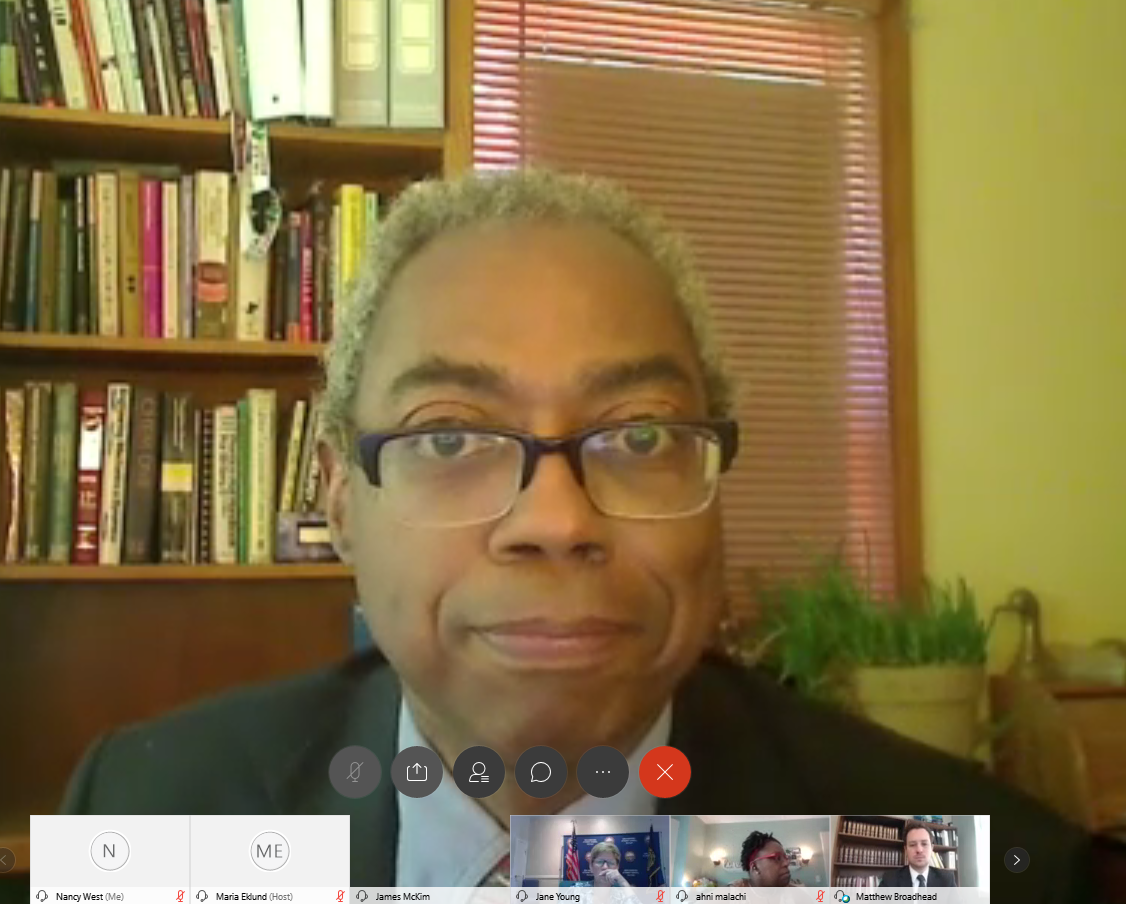By PAULA TRACY, InDepthNH.org
CONCORD – Every prosecutor in the state should have training on racial profiling, a long-time law professor and former public defender advised the panel on police accountability Monday.
Professor Albert “Buzz” Scherr of the University of New Hampshire School of Law has taught prosecutors for the past 27 years. He told the Governor’s Commission on Law Enforcement Accountability, Community, and Transparency that each prosecutor should also have annual implicit bias training.
Scherr told the commission he may be part of the problem. “I must do a better job” developing prosecutors to see racism in criminal justice.
The commission, which has about two weeks left to give recommendations to Gov. Chris Sununu on potential changes to police training, enforcement practices, and community accountability and transparency, also heard about police getting civil immunity from prosecution, the so-called federal “qualified immunity” doctrine.
Law enforcement officers on the commission said if that is overturned and police are held civilly liable, it will force an exodus out of the profession.
Scherr gave a number of recommendations for change predicated on the fact that a lot involves “cultural change” and that can take a generation or more. He called the cultural change a “big, different, sprawling topic.”
In his written testimony, Scherr recommended the state require prosecutors to report police conduct, just as a newly passed law requires police to report police misconduct. Another suggestion was to have a database on race/ethnicity data by prosecutors’ officers concerning chargings, indictments, dismissals, and decisions not to charge or indict.
He said there is a lot of overcharging of crimes in the state.
Scherr identified three separate levels of prosecution in the state, the Attorney General’s Office prosecutors, the county attorney level and the municipal prosecutors.
Training varies widely, Scherr said. He called it a “patchwork of training” noting each has different budgets, teachers and “to be blunt” a lot of it is from the law school where he teaches.
The state also has about 130 public defenders for people who cannot afford an attorney, and the centralized nature of that office allows for more uniformed training.
Scherr said every police department should have a uniform complaint form for the public that is available and transparent and organized in a way that information flows to everyone.
Scherr noted that conflict between police and prosecutors can exist and “calling out a police officer can cause problems…if police perceive they weren’t listened to and then they turn to the media” noting a recent case with the Hillsborough County Attorney’s office.
He recommended the book “Charged” by Emily Brazelon on prosecutions. https://www.penguinrandomhouse.com/books/548313/charged-by-emily-bazelon/.
James McKim, a member of the commission and president of the Manchester NAACP, also recommended a book to him, “The New Jim Crow.”https://www.amazon.com/New-Jim-Crow-Incarceration-Colorblindness/dp/1595586431
A copy of Scherr’s introduction and recommendations for the commission is here https://www.governor.nh.gov/sites/g/files/ehbemt336/files/documents/20200817-albert-buzz-scherr-testimony.pdf
Civil Liability for Police
According to lawfareblog.org, “qualified immunity is a judicial doctrine (created in 1982) that shields government officials from being held personally liable for constitutional violations – like the right to be free from excessive police force – for money damages under federal law so long as the officers did not violate ‘clearly established’ law.”
After the killing of George Floyd at the hands of white police officers in Minneapolis, the doctrine has been debated. https://www.theatlantic.com/ideas/archive/2020/06/congress-going-have-repeal-qualified-immunity/613123/
Senior Assistant Attorney General Matthew T. Broadhead addressed the commission on police immunity from prosecution and on qualified immunity.
He did not take an opinion on any changes and deferred that to the state legislature and the commission to decide.
“Our job is to just uphold whatever laws are in place,” Broadhead said.
He said the federal doctrine states that a plaintiff must show that the officer violated a constitutional right and that the right was clearly established such that a reasonable officer would have known that the right was being violated.
Broadhead represents state police in such cases.
Ronelle Tshiela a member of the commission and organizer for Black Lives Matter in Manchester, asked why someone should ask police officers about reform when it comes to protecting them?
Broadhead said he did not know who could give an answer to that but victims of police misconduct should have a seat at the table.
“It is important for us to remember the victims,” Tsheila said.
Londonderry Police Lt. Mark Morrison, a member of the commission, said he would do nothing to the qualified immunity doctrine other than to strengthen it.
Police are treated differently because they are asked to do things that others are not. He said police are asked, “to look evil in the face.”
Should qualified immunity change, putting officers financially at risk, “you would see an exodus from this profession such that you had never seen” before.
Hanover Police Chief Charles Dennis, head of the New Hampshire Police Chiefs Association, agreed, saying it was essential for law enforcement and removal of qualified immunity would have a “chilling effect.”
A challenge to the doctrine was not taken up in June by the U.S. Supreme Court despite support by the National NAACP Legal Defense Fund.
https://www.naacpldf.org/press-release/ldf-joins-cross-ideological-coalition-submitting-amicus-brief-case-challenging-qualified-immunity/
But it has been part of the national conversation propelled by the death of George Floyd.
Two commissioners who are NAACP leaders in New Hampshire, James McKim of Manchester and Rogers Johnson of the Seacoast, said they were not in support of the national position.
The commission plans to meet Tuesday, Wednesday and Thursday and will take public comment on Thursday. Those who would like to testify should email the commission in advance to LEACT@doj.nh.gov.
For more information and an agenda for the upcoming commission meetings, which are held virtually, visit https://www.governor.nh.gov/accountability.





